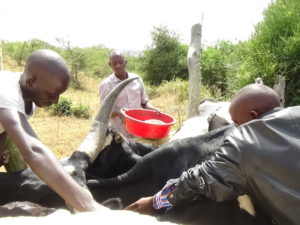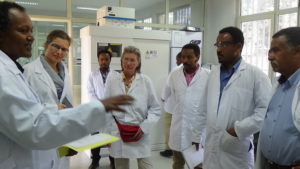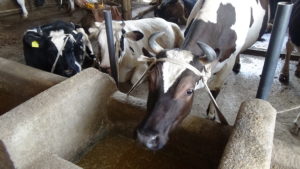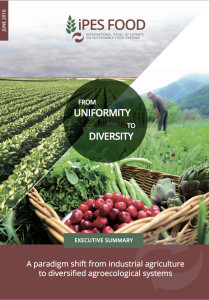Funders increasingly interested in Natural Livestock Farming
More and more organizations worldwide, inducing funding agencies, express their interest in the Natural Livestock Farming network and 5-layered strategy for ways to overcome common constraints in dairy farming.
 For example in Uganda, where the major problem is related to increasing resistance of ticks to chemical acaricides. Funds of TIDE program of SNV-Uganda are used by NLF partners in Uganda, India and the Netherlands to develop a new strategy based on good cattle management combined with herbal tick control.
For example in Uganda, where the major problem is related to increasing resistance of ticks to chemical acaricides. Funds of TIDE program of SNV-Uganda are used by NLF partners in Uganda, India and the Netherlands to develop a new strategy based on good cattle management combined with herbal tick control.
In Ethiopia, funders are supporting efforts to reduce antibiotic use and aflatoxine residues in cattle feed, which are affecting the quality of milk. The coming three years the Applied Research Fund is supporting NLF partner Ethiopian Society of Animal Production (ESAP) to strengthen laboratory capacity for residue analysis combined with animal health support to two cattle keeping communities.


Recognition by President of Ethiopia
During 1st Livestock Week celebrated 15-19 November 2017 in Addis Ababa, Dr Getachew Gebru Tegegn received a certificate of national recognition for his contribution to the development of the Livestock and fisheries sector in Ethiopia. The certificate was handed over by President of the Federal Democratic Republic of Ethiopia H.E. Dr Mulatu Teshome at a ceremony held at the Oromo Cultural Center, Addis Ababa. Dr. Getachew Gebru is International NLF board member, and the current president of the Ethiopian Society of Animal Production.
Source: ESAP, NLF partner
Natural Livestock Farming strategy for reducing Anti-Microbial Resistance
This NLF article in Approaches to Poultry-Dairy- and Veterinary science describes the general NLF strategy to improve milk quality and reduce the use of antibiotics in dairy farming
Grazing for Carbon by US dairy and pig farmer Joel Salatin
Interesting lecture Grazing for Carbon by US dairy and pig farmer Joel Salatin while recently visiting the Netherlands (56 minutes).
He explains about the principles of the natural ways of farming practiced on his farm, in which soil fertility is restored while numerous farm products are being produced!
https://youtu.be/vXknh7OlEtg
Political Declaration on Antimicrobial Resistance
Please find here the Political Declaration of the High-level Meeting of the General Assembly on Antimicrobial Resistance from the United Nations.
the Political Declaration of the High-level Meeting of the General Assembly on Antimicrobial Resistance from the United Nations.
A time for action: antimicrobial resistance needs global response
Given the magnitude and severity of the threat of antimicrobial resistance, it is a sign of progress that Member States of the World Health Organization (WHO) are now developing national action plans in response to WHO’s Global action plan on antimicrobial resistance.1 To accelerate these efforts, in April 2016 the Wellcome Trust held an interdisciplinary international summit, bringing together policy-makers and scientists from more than 30 countries to review and debate a set of 25 policy options.
The summit’s discussions reflected the multidimensional challenge posed by antimicrobial resistance. There are social, economic and environmental dimensions that encompass food production systems as well as human and animal health.
Please read complete article in "Bull World Health Organ" from WHO.
Interesting publications Review on Antimicrobial Resistance
 On the website of "Review on Antimicrobial Resistance you can find various interesting publications on Antimicrobial Resistance
On the website of "Review on Antimicrobial Resistance you can find various interesting publications on Antimicrobial Resistance
Indigenous cow to check drop in milk supply
Promotes indigenous breeds as global warming threatens dairy biz
Dairy provides livelihood to 60 million rural households in India, but the impact of global warming could have an impact on overall milk production in the coming years. Indian dairy scientist estimate that climate change will lead to decline in milk production. The decline in milk production and reproductive efficiency due to rising temperature will be highest in exotic and cross-bred cattle. Indigenous breeds will be least affected by global warming.
Please read article in Indian Newspaper.






